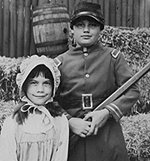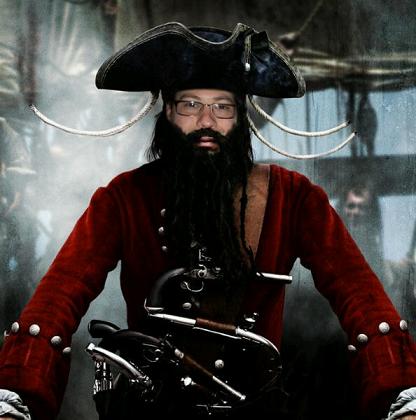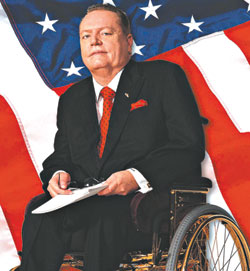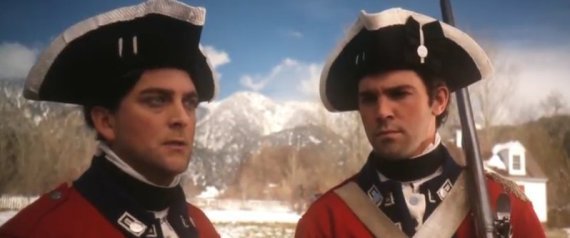Birth of a Buff
 This weekend marks the 148th anniversary of the Battle of Gettysburg (July 1-3, 1863). Gettysburg has always had a special place in my heart and as much as I enjoy living here in Fredericksburg, I wouldn’t mind living there either. You could say that Gettysburg is the entire reason that I became interested in history and later pursued it as the focus of my writing vocation. I recently posted a piece about my childhood experiences at Fort Ligonier Days, but Gettysburg, more than anywhere, made me the historian that I am today.
This weekend marks the 148th anniversary of the Battle of Gettysburg (July 1-3, 1863). Gettysburg has always had a special place in my heart and as much as I enjoy living here in Fredericksburg, I wouldn’t mind living there either. You could say that Gettysburg is the entire reason that I became interested in history and later pursued it as the focus of my writing vocation. I recently posted a piece about my childhood experiences at Fort Ligonier Days, but Gettysburg, more than anywhere, made me the historian that I am today.
Family time was always an important part of my childhood and vacations were eagerly anticipated in the Aubrecht house. Over the years, we had driven or flown to several destinations including Disneyworld, Niagara Falls, and Sea World. All of them were magical, but none as special as the place we visited in 1978. That was the summer my family traveled to the National Military Park at Gettysburg.
I remember it like it was yesterday and how funny the name "Gettysburg" sounded to me at the time. I also recall how I had absolutely no idea what was there. Did it have an amusement park, or a beach, or maybe some natural wonder, or a water park? Those were the types of getaways I was used to. "Nope." my mother said, "Don't worry. I think you'll like it." For some reason, both my mother and father kept the main attraction a surprise and I vividly recall asking them repeatedly on the drive there, where were we going and what we would see.
After what seemed like days, we finally arrived at this little tourist town in Pennsylvania greeted by miles of wooden rail fences and wheat fields. "What is this?" I asked myself, "Some kind of farm?" Pulling into the town, I can still picture all of the flags (both Union and Confederate) that adorned the doorways of virtually every store and hotel in sight. I also remember seeing what I thought were blue and gray cowboys painted on the signs for several museums and attractions. "Whatever took place here," I told myself, "it happened a long time ago."
As we checked in, my parents gave me a very brief introduction on where we were and why we were there. Hearing the key word "war," my mind began to race as I tried to take it all in. A Civil War? Americans fighting Americans? Soldiers? Slaves? Instantly a mass of both familiar and foreign terms sparked my interest. As we departed the hotel and began to sightsee, I found myself becoming more and more excited about where we were and what I was about to experience. I recall seeing real cannons for the first time and lots of big gray statues and monuments. I remember feeling so small while looking up at these giant bearded guys on horses that were wielding guns and swords. Very cool. Very cool indeed!
The battlefield itself was a bit of a bore initially as endless rock outcroppings and miles of grassy fields failed to capture the imagination of this six year-old boy. On the other hand, the many museums and other attractions we later visited really caught my eye. I clearly remember every sight we saw including the Electric Map, Wax Museum, Robert E. Lee's Headquarters, Jenny Wade's House, the Gettysburg Cyclorama, and of course the National Cemetery where miles and miles of tombstones mark the graves of fallen brothers in arms. After attending every show and spectacle available, the battlefield took on a whole new meaning and I vividly recall our second tour out to hallowed locations like Seminary Ridge, Little Round Top, High Water Mark, the site of Pickett's Charge and Devil's Den.
I remember ducking down behind the stone walls and pretending it was July of 1863. Often I would force my little sister to play the role of the "loser" in that particular melee and I must have shot her dead a thousand times. (Sorry Melissa.)
As our vacation progressed, the tales of these men and the three-day battle in which they participated captivated me. I began to understand the impact of the Civil War and respected the North's battle to preserve the Union, as well as the South's fight for state's rights. Initially, I struggled to find the villain in all of this. After all, when I played army at home it was always me, the American, fighting the Germans or Japanese. This "civil" war however was very different and even I could not bring myself to judge either the blue or the gray. Ultimately, neither side were true enemies.
Over the next few days, I spent every waking minute possible soaking up as much knowledge as I could on the War Between the States. I also soaked up a ton of souvenirs and went home loaded down with a kepi hat, musket pistol, books, toy soldiers, postcards, maps and even a bunch of View Master discs (remember those) that featured the photography of Matthew Brady. In retrospect, Mom and Dad definitely shelled out some cash on that trip. The following year we returned again and I don't think I ever anticipated a family vacation as much as that one. By then I was a seasoned seven year-old Civil War Buff who had even memorized the Gettysburg Address. "Four score and seven years ago…" This time, I understood exactly where we were and the sacrifice of the men President Lincoln honored in that speech.
What had started off as a simple family vacation changed my life forever as Gettysburg left an indefinable impression on me that remains to this very day. Now I live in Fredericksburg, Virginia and the same magic that I experienced in the north now surrounds me in the south. Just as I cannot forget this childhood experience, I cannot forget the men who fought and died so that America could be reborn in unity. God Bless every Billy Yank and Johnny Reb who fell on the fields of battle all across America and God Bless my parents who introduced me to them all.
Back in 2006, my father and I returned to Gettysburg. (Recap here)
Next post, next week...

...a feature-length piece presenting the story of Edward Teach, better known as “Blackbeard,” and his demise at the order of the Governor of Virginia, Alexander Spotswood. (As you can see, I have become a method-historian). Stay tuned.
The Founders did it too
 As someone with a specialized degree in Visual Communications, I’m living proof that anyone can become a published 18th-19th century historian. That said, I would never have pictured a legendary pornographer joining our ranks. Yet that is exactly what happened when Hustler publisher and free speech-activist Larry Flynt teamed up with David Eisenbach, a professor of American political history at Columbia University. The result is a tremendously decadent and unique book titled, One Nation Under Sex: How the Private Lives of Presidents, First Ladies and Their Lovers Changed the Course of American History. According to the publisher, this book "peeks behind the White House bedroom curtains and documents how hidden passions have shaped America's public life."
As someone with a specialized degree in Visual Communications, I’m living proof that anyone can become a published 18th-19th century historian. That said, I would never have pictured a legendary pornographer joining our ranks. Yet that is exactly what happened when Hustler publisher and free speech-activist Larry Flynt teamed up with David Eisenbach, a professor of American political history at Columbia University. The result is a tremendously decadent and unique book titled, One Nation Under Sex: How the Private Lives of Presidents, First Ladies and Their Lovers Changed the Course of American History. According to the publisher, this book "peeks behind the White House bedroom curtains and documents how hidden passions have shaped America's public life."
Billed as a collection of “history changing sex scandals” these are the salacious tidbits that have been apparently whitewashed from American textbooks. In an interview for Salon magazine Flynt stated why he wrote the book in the first place: “Well, we're often preoccupied with it even in our present society. Over the last 30 years there were a lot of corrupt politicians – usually involving sexual scandals. I just thought it would be interesting to go back and start with the Founding Fathers and see if they still existed. I was amazed it was so prevalent.” Obviously meant to be more entertaining than educational, the intent of the book is serious nonetheless. And by co-authoring it with a professor from Columbia, Flynt has added an element of scholarship. Although I have yet to read it or examine its sources, I am intrigued to say the least, especially in the sections on the Founding Fathers.
So what did Flynt find? Of course Thomas Jefferson’s renowned sexual relationship with Sally Hemings, a slave girl who he fathered multiple children with is included, as well as Benjamin Franklin’s infidelities while living in France. Franklin, perhaps the biggest playboy of all the Founders is actually credited with publishing a tabloid newspaper that had the first-ever sex advice column. It seems that Flynt and Franklin may have been kindred spirits. James Madison’s wife Dolly (and her sisters) are said to have thrown epic parties at the early White House which often included lots of wine and members of the Continental Army. According to the book, one of the president’s cabinet members said to him, “I know you don't want to hear this, but your wife has single-handedly turned the White House into a brothel.” Alexander Hamilton’s rarely discussed sex scandal is included. Apparently Hamilton was having an affair with a married woman while serving as the secretary of the treasury. Her husband, a gentleman named James Reynolds, began to blackmail Hamilton until word of it reached Congress. Following a formal investigation, it was determined that Hamilton had not used any of the state money to cover his tracks and was entrapped by the situation.
Although I doubt that Larry Flynt will become the next Bruce Catton, he does have an obvious gift for salacious entertainment. At the least, "One Nation Under Sex" sounds like a great bedside read. In closing his interview for Salon, Flynt offered up the book’s affect on his own perspective of America by taking the rest of us to task. He said, “Historians really get under my skin because I think they're the most anal-retentive group of professionals I've ever met. They can look at Mount Rushmore and get writer's cramps. Historians never wanted to believe that this magnificent man who drafted the Declaration of Independence had actually fathered children by a black slave. The publishers of history books tend to be conservative and they only want to know about policy and politics. They don't want to know about sex. That's why it's left out of these books and has been for centuries.”
Didn't the Founders go global?

The key tenets of global citizenship include respect for any and all fellow global citizens, regardless of race, religion or creed and the ability to give rise to a universal sympathy beyond the barriers of nationality. These noble sentiments can be traced back to our country’s earliest origins when a revolutionary author and pamphleteer Thomas Paine published The Rights of Man. In it he said, “My country is the world, and my religion is to do good.” The modern definition of global citizenship states: “In international relations, global citizenship can refer to states' responsibility to act with the awareness that the world is a global community, by recognizing and fulfilling its obligations towards the global world, as well as the rights of global citizens. Global citizenship is related to the international relations theory of idealism, which holds that all countries should include a level of moral goodwill in their foreign policy decisions towards one another.” It is my understanding that this does not mean to support others at the expense of your own country’s sovereignty or prosperity. It means to approach the world with the understanding that each country is part of a much bigger picture, and that countries can benefit from one another while working toward a common goal. This is nothing new. My church refers to the world as its mission field.
It is therefore very shocking to see the “anti-global movement” that has popped up among Tea Partiers and their supporters in recent years. The partisan resistance to the term “Citizen of the World” can be traced directly back to President Obama’s 2008 speech in Berlin. That moment forever changed a portion of the American public’s perspective on foreign relations. I will be the first to admit that there are a lot of President Obama’s policies that I don’t agree with. That said, I cannot believe that a more-global-minded approach to politics is not only desirable, but absolutely necessary to survive in 2011.
If Americans are wondering why the rest of the world is passing us by, perhaps they should look no further than this "superior-isolationist" attitude that some folks profess. I seem to recall the last administration burning an awful lot of bridges in support of their maverick agenda.
Not surprising, Glenn Beck has been one of the most outspoken critics of the concept. On his May 25th episode of The Glenn Beck Show he stated, “Tonight, we're kind of introducing something that we'll spend some time on history with in the coming days and weeks. But I have been telling you tonight about the push for globalization. I left my citizen of the world ID in my other pants. I hope they don't deport me now from the planet. There is no such thing as citizen of the world. We're Americans. We're humans. We're on planet earth, but we are Americans. But for Obama, it's time we all just come together. It's not good for America because you've got to equal out the entire world. If you understand the global governance thing that the world, I think, is trying to knit us together on, you'll understand why the president and his allies don't ever want to talk about American Exceptionalism. But America is an exceptional place. We've been an exceptional place because we are a special land.”
It may be an oversimplified critique, but I think that sounds pretty damn conceited and selfish in my opinion. The Tea Party has also been very upfront about this subject. On their website at teaparty.org, they post “Globalization spells the end of America.” I was thinking about this brash statement last week when I began to look at the Founding Fathers as global citizens. Once again, I think the TP folks have contradicted their own branding.
Weren’t Franklin, Jefferson and Adams (all Tea Party darlings) citizens of the world? Let’s examine their contributions abroad…
“It is a common observation here (Paris) that our cause is the cause of all mankind, and that we are fighting for their liberty in defending our own.” - Ben Franklin, Letter to Samuel Cooper, 1777
When Benjamin Franklin arrived in France as America's first ambassador, there were two major superpowers in Europe: England and France. Ambassador Franklin’s primary goal was to secure French aid to for the United States and although he spent the vast majority of his time kibitzing with the intellectuals and upper classes, he did develop a penchant for the plight of France’s peasant population. Franklin lived in France for a period of nine years and became an immensely popular and beloved resident of the quaint town of Passy, which was located just outside of the city of Paris. As the Minister to France, Franklin was a major player in the frontline politics involving much of Europe and the United States. A skilled diplomat, he negotiated treaties with Great Britain, France, Germany, Sweden, and Spain and helped secure America’s place in the world. As a respected scientist and scholar, he was granted honorary degrees in England, Scotland, and America. And as an Enlightenment thinker, he exchanged letters with some of the greatest minds of the eighteenth century. When Franklin left to return to America in 1785, he was replaced by fellow Founder Thomas Jefferson who wrote of his departure, “When he left Passy, it seemed as if the village had lost its patriarch.” Franklin died a mere five years later. Surprisingly it was his adopted home of France that mourned him with the pomp and ceremony befitting a man of his accomplishments. Even today, Ben Franklin remains a major figure in French history. According to Franklin historian Claude-Anne Lopez, “Many French think he was president of the United States. They say, ‘he was the best president you ever had!’”
“Be assured I shall ever retain a lively sense of all your goodness to me, which was a circumstance of principal happiness to me during my stay in Paris.” – Thomas Jefferson, Letter to Madame d'Enville, 1790
Franklin’s replacement, Thomas Jefferson, also became a well known and respected American representative, living on French soil from 1784-1789. Unlike Franklin, he was accompanied by his twelve-year-old daughter Martha (Patsy) and William Short as personal secretary. James Hemings, his nineteen-year-old slave, followed soon after to attend cooking school. Jefferson first took up residence at the Hôtel de Landron and then at the Hôtel de Langeac on the Champs-Elysées. Boasting relationships with some of the most powerful people in the country to include King Louis XVI and Marie Antoinette, he often appeared at the ministers' offices at the Palace of Versailles and when not attending to political affairs he immersed himself in French culture. In spring of 1785, John Adams and Jefferson successfully negotiated a loan from Dutch bankers to consolidate U. S. debts, pay long overdue salaries to French officer veterans of the American Revolution, and ransom American captives held by Algerian and Moroccan rulers. In May of 1789 Jefferson attended the opening of the French Estates-General and its debates at Versailles. He then drafted a charter of rights with Lafayette in June which served as the basis for the French Declaration of Rights that Lafayette presented to the National Assembly in July.
“Your Proposal of coming to me would make me the happiest of Men, if it were probable that I should live here where I am well settled. But, if the Negotiations for Peace should take a serious Turn, I shall be obliged to live in furnished Lodgings at Paris, or to travel 600 or 800 miles farther to Vienna.” – John Adams, Letter to Abigail, 1782
John Adams joined both Franklin and Jefferson in France before serving as an ambassador to the Netherlands. Accompanied by his eldest son, John Quincy, he represented America in the Dutch Republic, Republic of Venice and the Old Swiss Confederacy. In October 1782, Adams negotiated with the Dutch a treaty of amity and commerce, the first such treaty between the United States and a foreign power following the 1778 treaty with France. And with the aid of the Dutch Patriot leader Joan van der Capellen tot den Pol, he was able to secure the recognition of the United States as an independent government. During this visit, he also negotiated a loan of five million guilders financed by Nicolaas van Staphorst and Wilhelm Willink. The house that Adams bought during this stay in The Netherlands became the first American-owned embassy on foreign soil anywhere in the world. In 1784 and 1785, Adams was one of the architects of far-going trade relations between America and Prussia. Abigail Adams traveled to France in 1784 to join her husband. Soon afterward, Congress appointed him as the first United States ambassador to Britain's Court of St. James. In England from 1785-88, the Adamses regularly heard Unitarian Richard Price preach at Gravel Pit Chapel, Hackney. Adams enjoyed the English minister's friendship. He was also acquainted with Joseph Priestley, Theophilus Lindsey, Thomas Belsham, and many other British Unitarians. Adams's home in England, a house off London's Grosvenor Square, still stands and is commemorated by a plaque.
 This weekend marks the 148th anniversary of the Battle of Gettysburg (July 1-3, 1863). Gettysburg has always had a special place in my heart and as much as I enjoy living here in Fredericksburg, I wouldn’t mind living there either. You could say that Gettysburg is the entire reason that I became interested in history and later pursued it as the focus of my writing vocation. I recently posted a piece about my childhood experiences at Fort Ligonier Days, but Gettysburg, more than anywhere, made me the historian that I am today.
This weekend marks the 148th anniversary of the Battle of Gettysburg (July 1-3, 1863). Gettysburg has always had a special place in my heart and as much as I enjoy living here in Fredericksburg, I wouldn’t mind living there either. You could say that Gettysburg is the entire reason that I became interested in history and later pursued it as the focus of my writing vocation. I recently posted a piece about my childhood experiences at Fort Ligonier Days, but Gettysburg, more than anywhere, made me the historian that I am today.







 As someone with a specialized degree in Visual Communications, I’m living proof that anyone can become a published 18th-19th century historian. That said, I would never have pictured a legendary pornographer joining our ranks. Yet that is exactly what happened when Hustler publisher and free speech-activist Larry Flynt teamed up with David Eisenbach, a professor of American political history at Columbia University. The result is a tremendously decadent and unique book titled,
As someone with a specialized degree in Visual Communications, I’m living proof that anyone can become a published 18th-19th century historian. That said, I would never have pictured a legendary pornographer joining our ranks. Yet that is exactly what happened when Hustler publisher and free speech-activist Larry Flynt teamed up with David Eisenbach, a professor of American political history at Columbia University. The result is a tremendously decadent and unique book titled, 